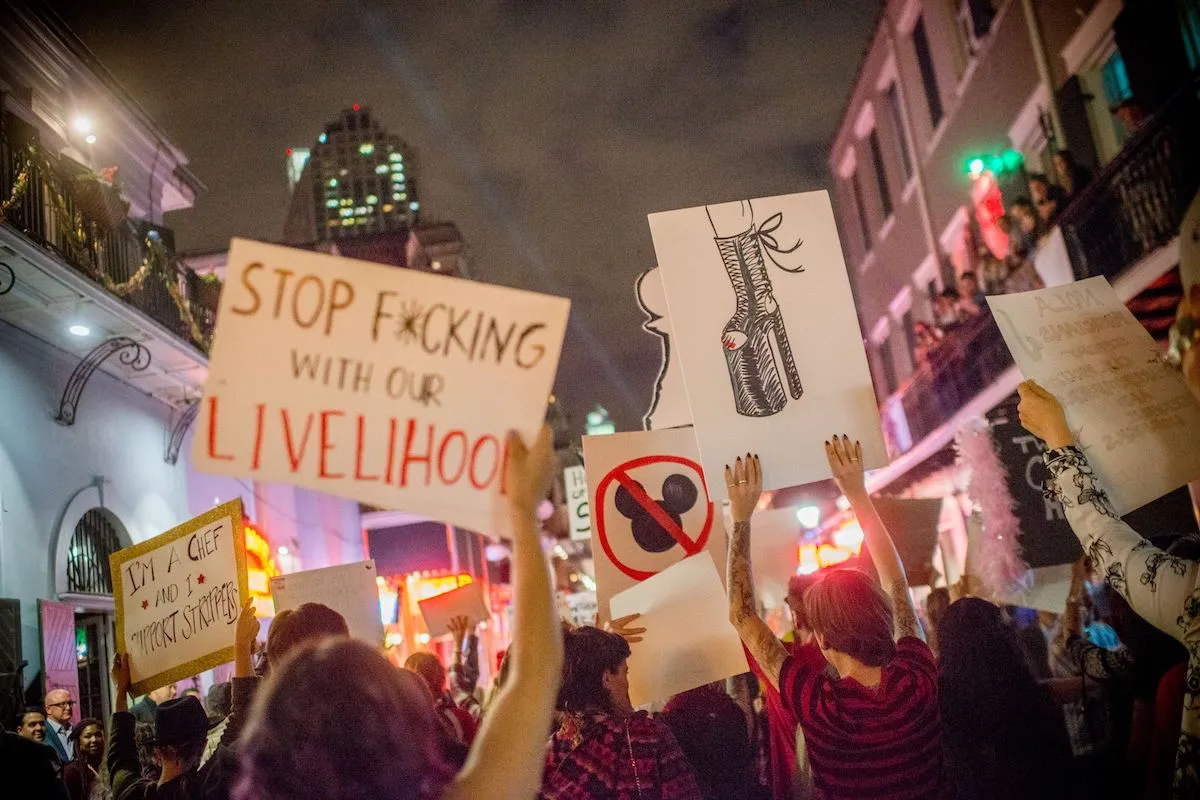It would be hard to imagine a presidential candidate in 2016 tweeting out “Sex workers, like all workers, deserve autonomy and are particularly vulnerable to physical and financial abuse,” let alone that sentiment drawing cheers and excitement from social media, but that’s just what happened on Thursday when, ahead of an HRC town hall, Elizabeth Warren unveiled her plan to support and advance LGBTQ Americans, and included in it that she was open to decriminalizing sex work. Sex worker rights and decriminalization of sex work are gaining traction and attention from politicians across the board, but it’s a complex issue and it’s sparked disagreements among democratic presidential candidates, and voters.
The movement to decriminalize sex work is not new. Advocates for sex worker rights cite the constant harassment, incarceration and abuse that sex workers are subject to from law enforcement as a main reason for decriminalization, and Amnesty International recommended in 2016 that all countries decriminalize prostitution. This is the “oldest profession” as the saying goes and advocates believe that consenting adult should be allowed to sell and pay for sex with out prosecution or persecution.
But what does “decriminalization” mean and how is it different from legalization? Well, the short answer is that both mean taking laws off the books that make sex work illegal, but legalization takes the extra step of regulating the industry. For sex workers distrusting of law enforcement and the state decriminalization if favorable to legalization. Legalization and regulation brings in a whole new slew of questions about the government declaring what people can do with their bodies.
There are a variety of models when it comes to decriminalization and legalization. One is the so-called “Nordic model,” based on the approach adopted in Sweden and other countries that ends the prosecution of sex workers while continuing to discourage and criminalize the sex industry. It should be obvious that this approach is not adequate for many sex work advocates in the US and is not favored by many of them. There is growing support support in the US for a more inclusive, general decriminalization.
The fight for decriminalization is being led by many organizations throughout the country, but perhaps the most visible and successful is DecrimNY – a New York-based coalition of organizations focused on meaningful legislation towards the goal of decriminalization. They’ve had some success already, both with the introduction of a bill to decriminalize sex work in New York state, and the victory of pro-decriminalization Tiffany Caban as the Queens District Attorney.
As the debate on sex work gains attention, it has attracted comment from various democratic presidential candidates. The position of these candidates is complicated, as all the senators in the race supported FOSTA-SESTA, a law intended to curb sex trafficking but had the effect of endangering and censoring sex workers of all kinds – from cam models to people who have sex for money. Only two senators voted against FOSTA-SESTA, Rand Paul and Ron Wyden, and neither of them are in the race.
The push for decriminalization and the effects of FOSTA-SESTA have pushed sex work into the limelight, but the varying platforms and policies of the democratic candidates highlight how complex the issue is and how wide a swath of opinions there are on the topic. For one, decriminalization of sex work, unlike decriminalization of marijuana, is not a matter for federal law. It’s up to the states, and while the federal government has tools, such as withholding or granting funding to states based on their positions on sex work, it will not be up to the president to personally decriminalize sex work. But the positions of the candidates still matter in the larger national conversation.
So what are their positions?
All the candidates still support FOSTA-SESTA. As we noted at the top, Elizabeth Warren is “open” to the concept of decriminalization. Bernie Sanders similarly is “thinking about” it. Both endorsed Tiffany Caban. Also open to the idea is Pete Buttigieg. Kamala Harris, though she has a complicated history of working against sex trafficking in ways that harmed other sex workers as a prosecutor, has come out in favor of decriminalization. However. she may be in favor of the Nordic Model, and that’s controversial. Cory Booker as well supports decriminalization. Joe Biden hasn’t given the issue much attention or comment, and his position is unclear.
The most hostile candidate to sex work is by far Amy Klobuchar. She was a sponsor of FOSTA-SESTA and has made fighting human trafficking a major part of her campaign and is not in favor of decriminalization. Klobuchar consistently conflates sex work with sex trafficking, but the issue of trafficking is a far different issue form decriminalization, and and end to trafficking and focus on stopping it rather than prosecuting consensual sex workers is focus of organizations like DecrimNY.
As this conversation continues, it will be interesting to see if the candidates positions evolve, especially in regards to FOSTA-SESTA and if they offer any sort of concrete plan for supporting decriminalization (or in the case of Joe Biden, any plan at all). It’s a complex issue but it’s encouraging that it’s finally part of the conversation.
(image: EMILY KASK/AFP/Getty Images)
Want more stories like this? Become a subscriber and support the site!
—The Mary Sue has a strict comment policy that forbids, but is not limited to, personal insults toward anyone, hate speech, and trolling.—










Published: Oct 13, 2019 12:41 pm